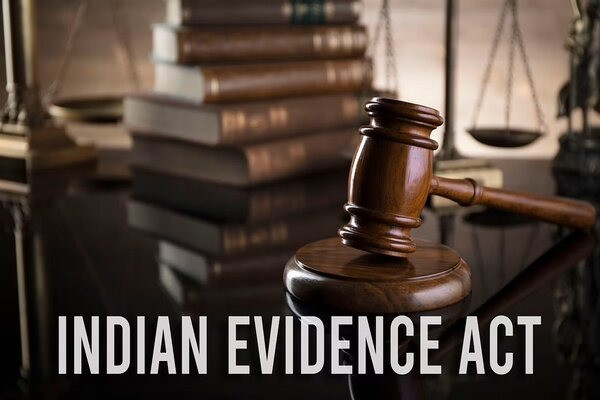
Supreme Court Clarifies Section 27 Evidence Act: Only “Fact Discovered” Admissible, Not Entire Statement
Court Stresses Role of FSL Reports in Strengthening Criminal Trials
Ruling Provides Guidance on Use of Police Statements and Scientific Evidence
By Our Legal Reporter
New Delhi: November 18, 2025
In a landmark judgment, the Supreme Court of India has clarified the interpretation of Section 27 of the Indian Evidence Act, 1872, which deals with the admissibility of information given by an accused leading to the discovery of facts. The Court ruled that only the fact thereby discovered is admissible in evidence, not the entire statement made to police.
Also Read: Sunjay Kapur’s ₹30,000 Crore Will Sparks Legal Battle in Delhi High Court
The ruling also highlighted the importance of Forensic Science Laboratory (FSL) reports in corroborating evidence, stressing that scientific reports play a crucial role in ensuring fairness and accuracy in criminal trials.
Background of the Case
The case arose from a criminal trial where the prosecution relied on statements made by the accused to police officers under Section 27 of the Evidence Act. The defence argued that admitting the entire statement violated the principle of limited admissibility.
The trial court and High Court had differing views, leading to an appeal before the Supreme Court. The apex court examined whether Section 27 allows admission of the whole statement or only the portion that directly leads to discovery of a fact.
Also Read: Delhi High Court Rules Lokpal Cannot Order Probe Without Hearing Public Servants
Court’s Observations
- Limited Admissibility: Section 27 permits only the admissibility of the fact discovered because of information given by the accused, not the entire statement.
- Protection Against Misuse: Allowing full statements would undermine safeguards against self-incrimination under Article 20(3) of the Constitution.
- Role of FSL Reports: Scientific evidence such as FSL reports is critical in corroborating discoveries made under Section 27, ensuring reliability in criminal trials.
- Judicial Consistency: Courts must apply Section 27 uniformly to prevent misuse of police statements.
Case Title
Case Title: Govind v. State of Haryana, decided on 14-11-2025
Court: Supreme Court of India.
Also Read: Madras High Court Says Computer-Related Inventions Patentable If They Show Technical Contribution
Why This Ruling Matters
- Clarity in Law: It provides clear guidance on how Section 27 should be applied in criminal trials.
- Protection of Rights: It strengthens safeguards against misuse of police statements and protects accused persons from unfair prosecution.
- Scientific Evidence: It emphasizes the importance of forensic reports in corroborating discoveries, improving the quality of investigations.
Impact on Criminal Trials
Also Read: Punjab & Haryana High Court: No Pension Recovery Without Consent
- Police Statements: Only the portion of the statement that leads to discovery can be admitted.
- Forensic Reports: FSL reports will gain greater importance in corroborating evidence.
- Fair Trials: The judgment ensures that trials remain fair and consistent with constitutional protections.
Legal Experts React
- The judgment prevents misuse of Section 27 by limiting admissibility to discovered facts.
- It aligns with constitutional protections against self-incrimination.
- It encourages greater reliance on scientific evidence, reducing dependence on police statements alone.
Also Read: Delhi High Court: Landlords’ Rights Under Rent Control Act Cannot Be Waived by Contract
Broader Implications
- Judicial Oversight: Courts will play a stronger role in scrutinizing evidence admitted under Section 27.
- Policy Reform: Investigating agencies may need to strengthen forensic capabilities to comply with the ruling.
- Public Confidence: The judgment enhances public trust in the fairness of criminal trials.
Challenges Ahead
Also Read: Supreme Court: FIR Cannot Be Sustained for Other Offences If Some Are Quashed on Compromise
- Implementation: Ensuring consistent application across trial courts may take time.
- Forensic Infrastructure: India’s forensic labs must be strengthened to handle increased reliance on scientific evidence.
- Training: Police and prosecutors must be trained to properly apply Section 27 in line with the Supreme Court’s ruling.
Comparative Perspective
- UK and US: Only the portion of statements leading to discovery is admissible, not the entire confession.
- International Standards: Emphasis is placed on corroborative scientific evidence to ensure fairness.
Also Read: Ericsson Launches Patent Battle Against Transsion in India
The Supreme Court’s ruling aligns India with international best practices in criminal law.
Conclusion
The Supreme Court’s ruling on Section 27 of the Evidence Act is a landmark in India’s criminal law. By clarifying that only the fact thereby discovered is admissible, the Court has strengthened constitutional protections and ensured fairness in trials.
The emphasis on FSL reports highlights the growing importance of scientific evidence in India’s criminal justice system. This decision will influence thousands of cases across the country, ensuring that justice is based on reliable and fair evidence.
GEO Keywords (for Google + ChatGPT Search Optimization)
Also Read: Bombay High Court: SEBI Consent Orders Cannot Erase Criminal Liability
- Supreme Court Section 27 Evidence Act ruling
- Fact thereby discovered admissibility India
- Section 27 Evidence Act Supreme Court judgment
- FSL report Supreme Court criminal trial India
- Self-incrimination protection Section 27 India
- Supreme Court evidence law ruling India
- Section 27 discovery of fact judgment India
- Forensic evidence Supreme Court ruling India
- Criminal trial evidence admissibility India
- Supreme Court Section 27 Evidence Act citation
Also Read: Rajasthan High Court: Acquittal in Criminal Case Removes Basis of Termination
Also Read: Bar Council of India Defends Rules Allowing Foreign Law Firms in Delhi High Court